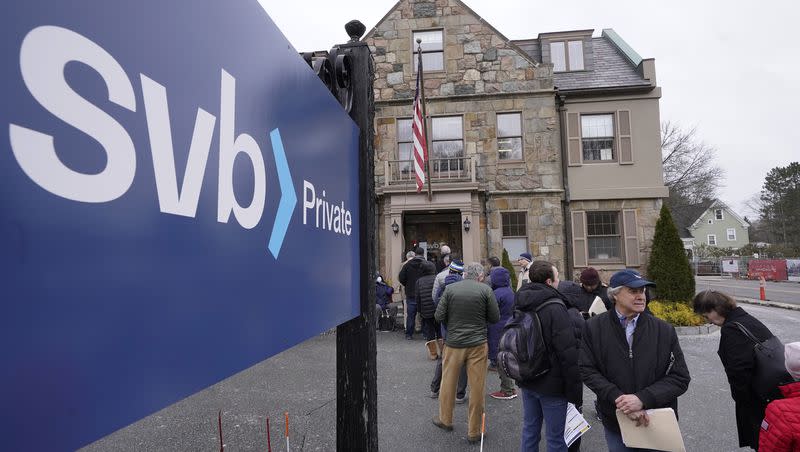Perspective: How the Silicon Valley Bank crisis revealed our blind spots

Have you ever looked into a funhouse mirror at a county fair or carnival? Or taken an ink blot test where you see either a young woman or an old hag? Isn’t it hilarious how once you buy a certain car, you notice dozens of them around town?
I’m generally skeptical of pop psychology that tries to tease out personality traits by what you see, but it’s fascinating how the same event elicits different responses. Many times, we see the narrative we want before we understand the facts. These quirks make for funny icebreakers at parties but can be downright hostile for responsible policymaking.
The recent collapse of Silicon Valley Bank will be a case study that MBA students will debate for decades. However, it’s also a mirror that we can hold up for our political leaders, society, and, frankly, ourselves to check our own personal blind spots and biases.
The bank failure was a perfect storm of many ill-conceived decisions combined with economic forces outside of anyone’s control, some related to the COVID-19 pandemic.
During the lockdowns, we all relied on relatively new technologies to work, take care of our kids and entertain ourselves. I was teaching my economics classes on Microsoft Teams and chatting with co-authors on Zoom (programs that I had no idea existed just a few months earlier). At the same time, I was monitoring my kids’ Google classroom and trying to buy myself some peace in my makeshift home office (thanks Disney+ and Roblox).
New start-ups that had no idea they would become the main engines of the work-from-home economy were suddenly awash with cash. Some, overconfidently, assumed that this trend would continue indefinitely. Their huge cash deposits sat at regional banks, like SVB, which then needed to figure out how to manage this new liquidity. Monday morning quarterbacks vastly outnumber those who play on Sundays, but these banks chose to purchase long-term treasury bonds with fixed interest rates near zero. SVB essentially froze its liquidity in what, generally, is a risk-free asset.
Related
However, as the Federal Reserve abruptly changed course by raising interest rates to combat inflation after the administrations of both parties blew up the deficit, the bond market was flooded with new assets promising much higher returns on investments given the higher rates. Silicon Valley Bank could not liquidate these assets, which are normally easy to cash, in order to pay depositors on demand. A bank run ensued.
Bank runs are all about confidence. Normally, the federal government will insure deposits up to $250,000. The Biden administration decided to make all depositors “whole” while cutting out executives and investors. That is the nature of banking: those who share in the profits win in the upswing but lose in the downswing. If done correctly, the government won’t pay the whole amount. If confidence returns, depositors won’t think twice about their accounts. This extra insurance may create an incentive for larger deposits and risk taking.
But in today’s policy world, facts are not only inconvenient but don’t really register at all. Emotion and “going viral” is the name of the game; not wisdom or leadership.
One wing of our public discourse has devoted much of its time and energy into fighting irrelevant culture wars. Outrage is a hard habit to break, especially when it’s rewarded by votes and donations.
Others with populist anger can only see the world in black and white. For every crisis, there must be heroes and villains. Someone to punish and someone to save. Reality is rarely that stark. Life is about tradeoffs, often with murky incentives and an obstreperous future. Prophecy is rarely profitable, and we want simplicity, not complexity.
How we deal with a crisis like this is as revealing as a Rorschach test; it reveals our intellectual honesty and character. Do we turn to information sources that confirm our previously held beliefs, or do we try to understand the world from multiple perspectives?
Like this current banking crisis, our republic is also a reflection of its citizenry. Do we like what we see?
Michael S. Kofoed, @mikekofoed on Twitter, is an associate professor of economics at the U.S. Military Academy and a research fellow at the Institute of Labor Economics. A Utah native, he holds degrees in economics from Weber State University and the University of Georgia. These opinions are those of the author and do not represent the U.S. Military Academy, the Department of the Army or the Department of Defense.

